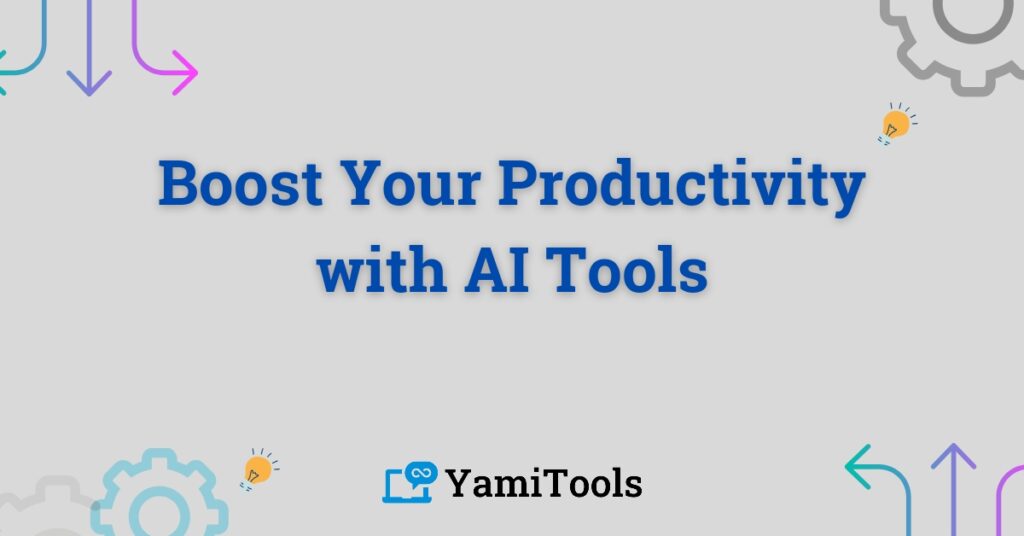Boost Your Productivity with AI Tools

Introduction
In today’s fast-paced world, efficiency and productivity are more important than ever. With the advent of artificial intelligence, a plethora of AI productivity tools have emerged, designed to streamline workflows and boost efficiency across various industries. These tools leverage advanced algorithms and machine learning to automate mundane tasks, provide insightful analytics, and enhance decision-making processes.
Whether you’re a freelancer juggling multiple projects, a small business owner, or part of a large enterprise, AI productivity tools can be game-changers. They can save you time, reduce errors, and help you focus on what truly matters. Let’s delve into some of the most impactful AI productivity tools available today and how they can transform your work life.
Key Takeaways
- Efficiency: AI tools automate repetitive tasks, saving time.
- Accuracy: Reducing human error with advanced algorithms.
- Insight: Providing valuable analytics and data insights.
- Flexibility: Applicable across various industries and roles.
AI-Powered Writing Assistants
AI-powered writing assistants are transforming how we create content, edit documents, and communicate. These tools can help with grammar corrections, style suggestions, and even generating content ideas.
Grammar and Style Checkers
Grammar and style checkers like Grammarly and Hemingway Editor use AI to scan your text for grammatical errors, punctuation mistakes, and stylistic issues. They provide real-time suggestions to improve clarity, coherence, and overall readability.
- Grammarly: This tool offers advanced grammar, punctuation, and style suggestions. It also provides context-specific recommendations to enhance your writing.
- Hemingway Editor: Known for its simplicity, Hemingway highlights complex sentences and common errors, promoting concise and clear writing.
Content Generation Tools
Content generation tools such as GPT-3 and Jasper use natural language processing to create high-quality content based on user inputs. These tools can generate articles, blog posts, and even social media updates, saving time and effort.
- GPT-3: Developed by OpenAI, this powerful tool can generate human-like text based on prompts, making it ideal for drafting content quickly.
- YamiTools: YamiTools is all in one ai app for content generation that specializes in creating marketing copy, blog posts, and other content materials with minimal input.
AI-Powered Project Management
Project management tools powered by AI can significantly enhance team collaboration, task management, and project tracking. These tools leverage machine learning to predict project outcomes, optimize resource allocation, and automate routine tasks.
Task Automation
Task automation tools like Asana and Trello integrate AI to streamline workflow management. They can automate task assignments, set reminders, and track progress, ensuring that projects stay on schedule.
- Asana: Asana’s AI features include automated task assignments and deadline reminders, helping teams stay organized and efficient.
- Trello: Trello uses AI to suggest task prioritization and automate repetitive actions through its Butler feature.
Predictive Analytics
Predictive analytics tools such as Microsoft Project and Smartsheet use AI to forecast project timelines, identify potential risks, and suggest optimal strategies. These insights enable proactive decision-making and risk management.
- Microsoft Project: This tool uses AI to predict project completion dates and resource needs, helping managers plan more effectively.
- Smartsheet: Smartsheet’s AI capabilities include predictive analytics for project tracking and performance optimization.
AI for Customer Relationship Management (CRM)
AI-powered CRM tools help businesses manage customer interactions, analyze customer data, and automate sales processes. These tools can enhance customer service, improve sales strategies, and boost overall customer satisfaction.
Automated Customer Service
Automated customer service tools like Zendesk and Freshdesk use AI to handle customer inquiries, provide instant responses, and escalate complex issues to human agents when necessary.
- Zendesk: Zendesk’s AI features include chatbots and automated ticket routing, improving response times and customer satisfaction.
- Freshdesk: Freshdesk leverages AI to automate customer support tasks and provide real-time assistance through chatbots.
Sales Automation
Sales automation tools such as Salesforce and HubSpot use AI to streamline sales processes, from lead generation to closing deals. These tools can predict customer behavior, personalize communication, and optimize sales strategies.
- Salesforce: Salesforce’s AI, known as Einstein, offers predictive analytics, automated data entry, and personalized customer insights.
- HubSpot: HubSpot’s AI features include automated lead scoring, email personalization, and sales forecasting.
Conclusion
AI productivity tools are revolutionizing the way we work, offering innovative solutions to enhance efficiency, accuracy, and insight across various industries. By automating mundane tasks and providing valuable analytics, these tools allow professionals to focus on strategic activities and achieve better results. As AI technology continues to evolve, the potential for productivity gains will only increase, making it essential for businesses and individuals to embrace these tools and stay ahead in the competitive landscape.
FAQs
What are AI productivity tools?
AI productivity tools are software applications that use artificial intelligence to automate tasks, provide insights, and improve efficiency in various workflows.
How can AI improve writing?
AI can enhance writing by providing grammar and style corrections, generating content ideas, and automating the creation of text, making the writing process faster and more accurate.
Which AI tools are best for project management?
Some of the best AI tools for project management include Asana, Trello, Microsoft Project, and Smartsheet, all of which offer features like task automation and predictive analytics.
Can AI help with customer service?
Yes, AI can significantly improve customer service by automating responses, handling inquiries through chatbots, and providing instant support, leading to better customer satisfaction.
What is the role of AI in CRM?
AI in CRM helps manage customer interactions, analyze data, automate sales processes, and improve customer service, ultimately enhancing customer relationships and business efficiency.
